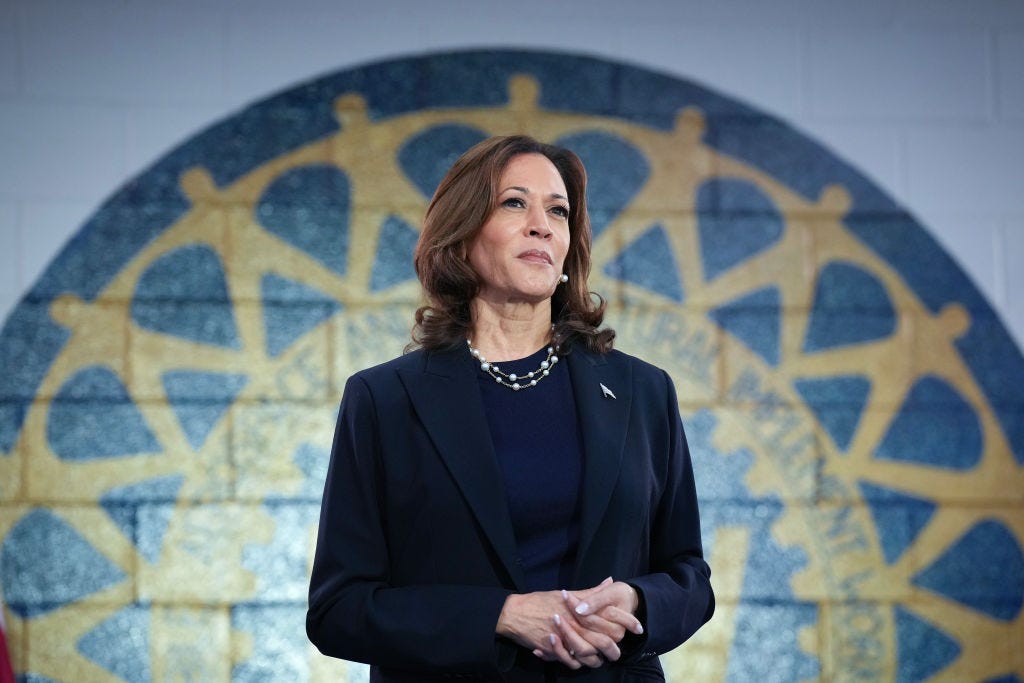Throughout my life, whenever people have said that we need more women in politics, my response has always been the same: It matters which ones. I felt then, as I do now, that female politicians, like all other politicians, should be judged by their actions and not their identities.
The argument that’s now advanced in pop culture — “more women leaders automatically equals better governance — is as simplistic as it is easily disputed. (It’s also highly selective, since those advancing this argument wouldn’t dream of applying it to, say, Sarah Palin.) Ultimately, the “more women in power now!” chorus preferences the symbolic over the material, and in doing so, necessitates a break with reality.
This exact dynamic has been on display in recent weeks, with the meteoric rise of Kamala Harris. The rallying cry online that Harris is destined be America’s first female president has gained so much momentum that nobody seems to be asking what she’d do if she got to the oval office.
In the fever pitch of the current moment, we’re expected to suddenly be ecstatic about her run — when just weeks ago Harris was widely considered a weak candidate, including by many of the same media outlets that are now banging the drum for her.
We should remember that her previous run for president tanked. When Harris pulled out of the race in 2020, she was polling at 4 percent or lower. She has since failed to impress, and her approval ratings have reflected this. She has not been a particularly visible vice president (Aziz Ansari joked in a comedy special that there was more footage of Big Foot than there was of Kamala Harris). And the main issue she has been attached to — Biden’s handling of the border — has not gone well.
There’s also the not insignificant matter of her possible involvement in a cover-up surrounding Joe Biden’s declining health.
Her other liabilities are considerable, too: She’s famous for word salad speeches that are heavy on sentiment and light on meaning. And her track record is reflective of this, showing no indication that she possesses a coherent set of governing principles.
As district attorney in San Francisco, Harris oversaw more than 1,900 convictions for marijuana offences, and then years later, when it was politically expedient, championed efforts to legalize pot and admitted she’d even smoked it herself.
As California’s Attorney General, she defended misconduct from prosecutors and declined to intervene in cases of police-involved killings — but then, in 2020, rode the wave of enthusiasm for criminal justice reform. The New York Times has pointed out that in her book Smart on Crime, published in 2009, Harris wrote that “if we take a show of hands of those who would like to see more police officers on the street, mine would shoot up,” and “virtually all law-abiding citizens feel safer when they see officers walking a beat.” But after the death of George Floyd, she told the paper that “it is status-quo thinking to believe that putting more police on the streets creates more safety. That’s wrong. It’s just wrong.”
Perhaps the most troubling disconnect between her record and her newly-minted status as a progressive icon dates back to her defiance of a 2011 Supreme Court ruling to reduce the population in California prisons. The Supreme Court had found that overcrowded conditions in the state’s prison system violated the Constitution’s protections against cruel and unusual punishment. At the time, Harris was Attorney General and her office argued that reducing the prison population would be detrimental, as it would impact the state’s ability to fight wildfires by reducing the availability of forced labour. (When this made news, Harris told BuzzFeed that she was “shocked” to hear of her lawyers’ argument.) For the record, these prisoners earned between 8 and 37 cents per hour.
Given all this, the media’s cheerleading — from puff pieces in Time to a celebratory ‘Kamelot’ cover for New York Magazine — is bizarre. Particularly since Harris has thus far avoided doing actual media interviews where she might be pressed on actual public policy.
The Time article quotes David Hogg, co-founder of Leaders We Deserve, as saying: “Elections come down to vibes, and Kamala has got the vibes right now.” But this is a fundamental misunderstanding of what citizens care about and vote on, and indeed the key mistake Democrats make when it comes to the public they serve.
Imagine an individual in a swing state, working paycheck to paycheck and struggling to get by. Is this person supposed to be moved in any meaningful way by a viral meme? Does this person really care if the out-of-touch politician ignoring their interests this time around happens to be a woman? Does having a female president help in any tangible way if her policies don’t improve your material well-being?
With the Democratic National Convention kicking off tomorrow, these are questions the media should be asking.





Love this Tara. The Kamala facade appears to be a 100% media fabrication. Unbelievable. At what point does trust in media fall to zero?
The very same people who tell us that we need more women in politics hate Premier Danielle Smith.
She is a woman, but not their kind of woman. Whether you like Danielle Smith or not, she can do what most politicians can not. She can talk for hours with out notes on many different policies. She talks with nuance, and understands the complexity of public policy.
She can talk for hours about subjects like "Carbon Capture & Storage", or alternate energy but because she doesn't promote the "Green Agenda" it does not matter that she knows far more than her critics.
Point being, those who insist on "tick boxing" usually have a very limited understanding of the issues.